Written by: Gaeten Agbaam and Francis Boafo Asamoah, both YRE youth board.
Photo by: Francis Boafo Asamoah, YRE.
Genesis 2:15: The Lord God took the man and put him in the garden of Eden to work it and keep it.
Today is World Environment Day. Every year, 5 June this day is celebrated across the world to remind people of their duties and responsibilities towards our natural environment. The World Environment Day had its genesis in 1972 when the first high level conference on the Environment was held in Stockholm, the capital of Sweden - the beginning of the process that eventually led to the Sustainable Development Goals.
Despite 50 years of focus on the environment, we the people of the planet has continued deplating our environment at unpresidential rates - leading to loss of biodiversity at a rate that has eliminated 60% of the species on planet earth and is now threatening our livelihoods as the Ecosystems we depend on for food production, clean water and stable climate is collapsing. Therefore we are now in the decade of having entered the UN decade of Ecosystems restoration to prevent, halting and reversing the degradation of ecosystems worldwide - this year's World Environment Day calls for urgent action to revive our damaged ecosystems. Unfortunately Ghana is one of the countries worldwide with the fastest degradation of its ecosystems, and is one of the reasons. The government has declared war on Galamsey, illegal mining for gold, however a general understanding of the negative effects of the massive destruction it has on people's livelihood and the environment is needed to get people on board to halt the illegal mining but also restore the damaged environment. Young Reporters for Environment (YRE) has looked into the problem and what needs to be done.
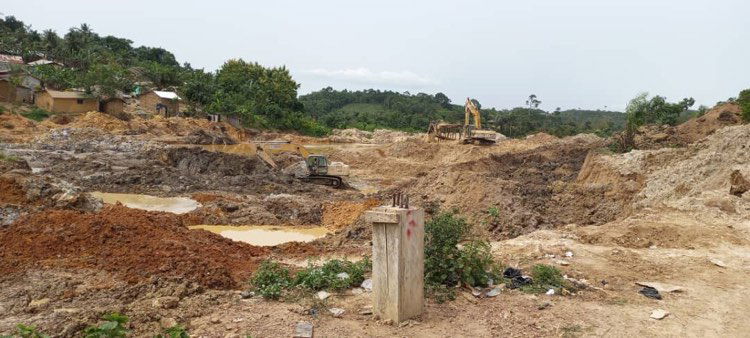
“Galamsey” is local slang for the process of extracting ore or minerals from the ground with the absence of land rights, mining license, exploration or mineral transportation permit or any document that legitimate allows the operation and are subject to regulation by either the Environmental Protection Agency or the Minerals Commission, or both and it can be operated on the surface or underground. Mining without registration and regulation is illegal because they are unregulated and operated outside the law (Amoah-Frimpong, 2013).
Galamsey has a strong negative effect on environmental, health, economic and the social situation in many local communities, and also on Ghana as a whole. The Galamsey operations, mainly lead by chinese business people, are tremendously undermining the lands and endangering the livelihoods of farmers and continues to pose complex environmental, health and livelihood problems in communities where the illegal mining is taking place. It has affected rural livelihood by lowering agricultural activities such as reducing fishing, reducing shea-nut picking, destroying oil palm plantations and spoiling cocoa trees.
Years of low cocoa production in the high production areas in Ghana (ie Western, Western North and Ashanti) have pressed many cocoa farmers to sell their lands to groups of small-scale gold miners - while at the same time cocoa-farming is gradually moving to China where it is industrially produced. Galamsey has affected our cultural activities such as hunting and swimming at the river or dams and also, causing the death of livestock, theft of animals, unproductive farm lands which has gone a long way to affect the reduction of labour for farming activities in such communities - and most seriously it has damaged the drinking water for thousands of people. Poor people that used to fetch water for free now have to buy their water in many areas.
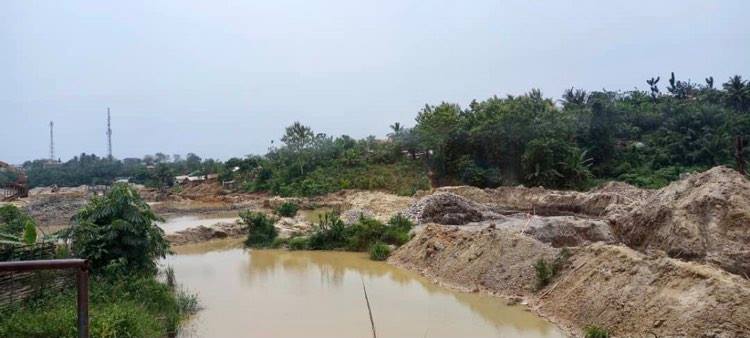
Galamsey has destroyed lots of vegetation and farmlands, causing pollution, creating open pits, and causing displacement of people. Over 60% of the total land area in Tarkwa is open pit large of scaled mining concessions, destroying farm lands as well as vegetation in the community. In these illegal mining communities, land degradation, open pits, farmlands destruction, the displacement of people and water pollution are major threats by illegal surface mining. The Toxic chemicals added to the water bodies such as mercury, cyanide arsenic, lead and copper pollute underground waters and streams. These chemicals pose threats to ecological and aquatic animals as well as health threats to miners and the people in surrounding communities and as well pollutes water bodies, affects food crops and human health. The dramatic nature galamsey operations in Ghana has for long caught the attention of the media, government agencies, local and international pressure groups due to their operations destroying several water bodies and causing serious environmental problems.
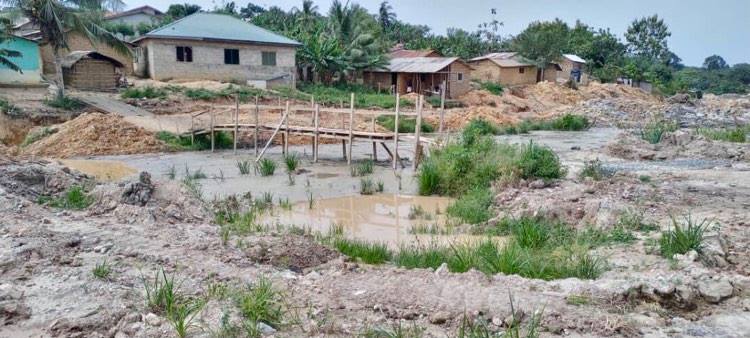
Not only are these miners destroying farms, the are actively destroying protected forest and associated biodiversity. According to the World Resources Institute, in 2017 and 2018 Ghana and Côte d’Ivoire experienced the highest percent rise in primary forest loss than any tropical country.
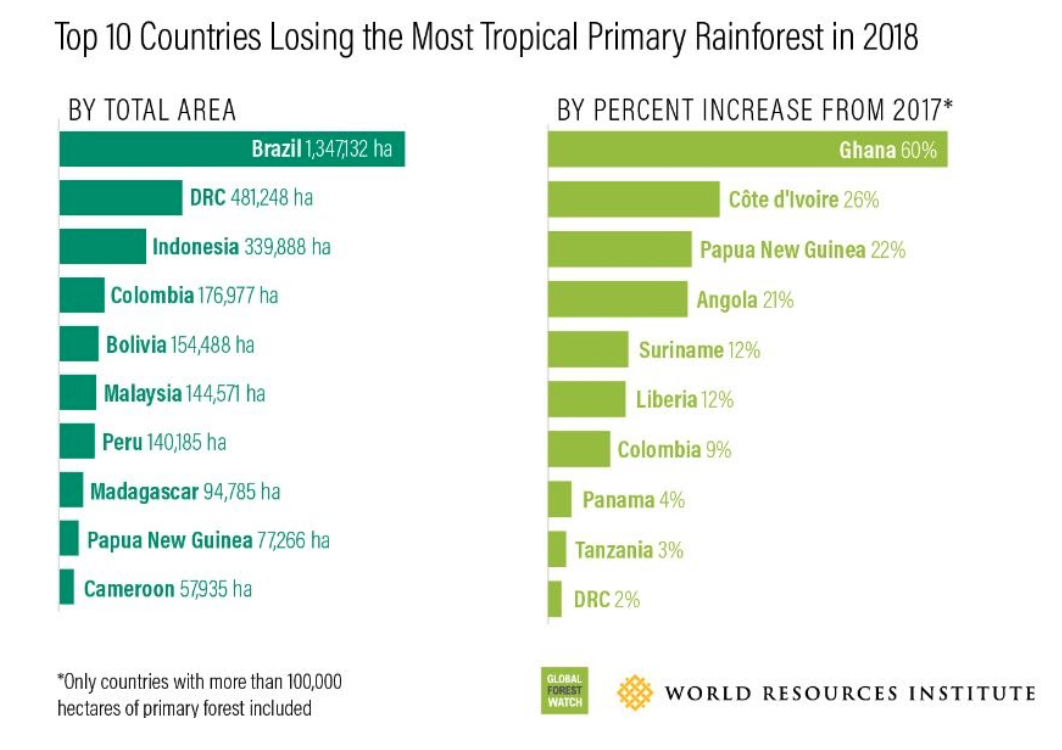
Over fifteen forest reserves have been destroyed leading to the disappearance of endemic and other important species for ecosystem function. Biodiversity is the foundation of Human life and human well – being is affected by the state of the global environment and sustainability of ecosystems. The continued loss of biodiversity in the country represents a direct threat to our health and wellbeing of our people. Illegal mining instigated the highest rise in primary forest loss especially in protected areas in Ghana. This destruction has continued for a long while and have drastically affected both terrestrial and aquatic biodiversity in the country.
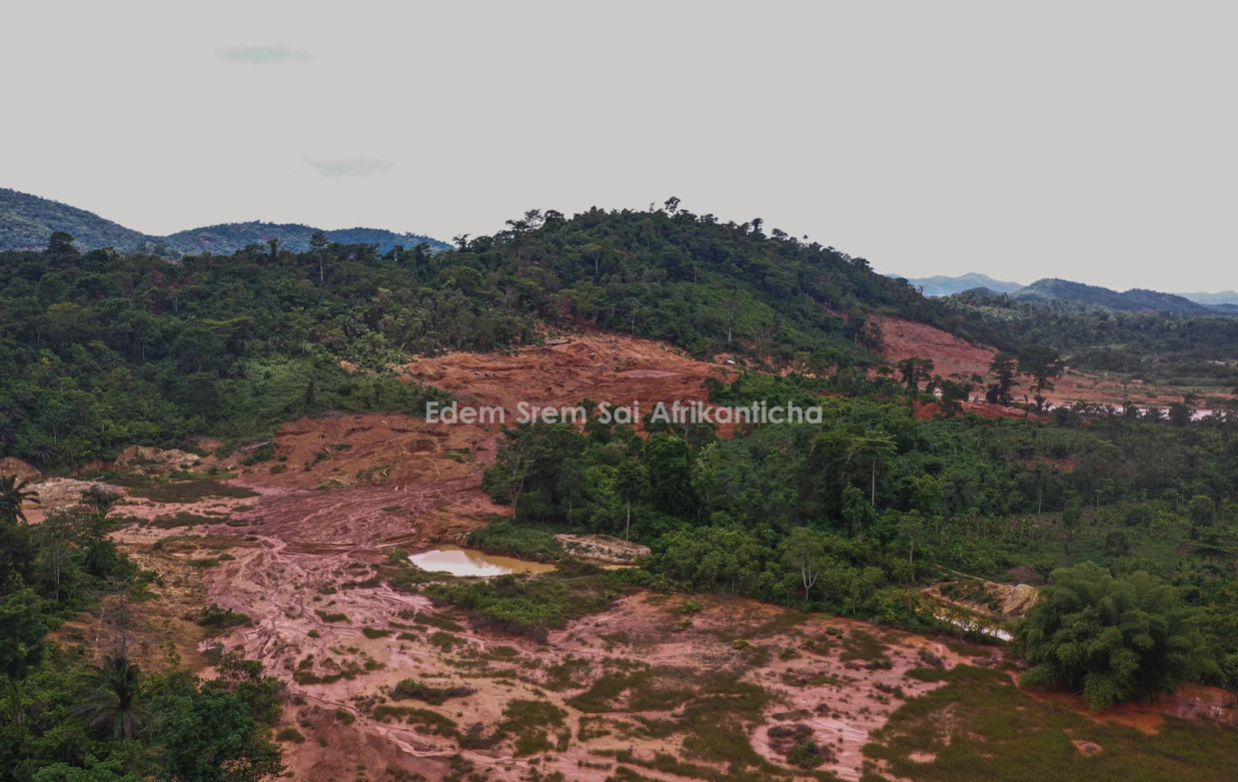
A number of vigorous campaigns have been launched against all related artisanal and small-scale mining across the country. A campaign dubbed #StopGalamsey, which was initiated by City FM (a local radio station in Accra) and supported by the Ghana Journalists Association (GJA), think tanks, civil society organizations (CSOs), and non-governmental organizations first put the Galamsey issue on the national agenda. These kinds of campaigns compelled the government to ban all illegal small-scale mining activities from March 2017 to December 2018. As such, the ban was clearly a part of the large process of a top-down formalization policy by the government meant to address the socioenvironmental problems caused by Galamsey and to ensure that the sector contributes to sustainable development in the country. An Inter-Ministerial Committee on Illegal Mining was formed by the government of Ghana to help reform the sector in Ghana and make living standards easy for the citizenry. Millions of GhC from the national security budget has been put into stopping the activities, but so far it has not come to an end, in fact its spread is continuing.
Therefore, in conclusion, Young Reporters for Environment (YRE) suggests that a more educative and citizens involvement approach is added to the national strategy. By involving the people in local communities in the restoration of the destroyed land and ensuring that their farming pays off is likely to make the local communities in fellowship with the broader Ghanaian society, step up against the illegal miners.</span><span>Drastic measures are needed if we are to survive now and more dangerous happenings predicted for the future if we continue business as usual.Restoration of degraded ecosystems and protection of remnant ones gives us hope for a better future. A future where healthy ecosystems are promoted, a future that inculcates protection and sustainable use of natural resources and a future where nature's inherent values are respected and man and nature lives in harmony. Completely hulting illegal and destructive mining is the first step. Gong forward policy advocacy, education and punishment are needed to sustain these efforts together with effective monitoring.
We cannot turn back time. But we can restore what we have left. We are the generation that can make peace with nature.
Let’s get active, not anxious. Let’s be bold, not timid.
Join #GenerationRestoration
Example Text